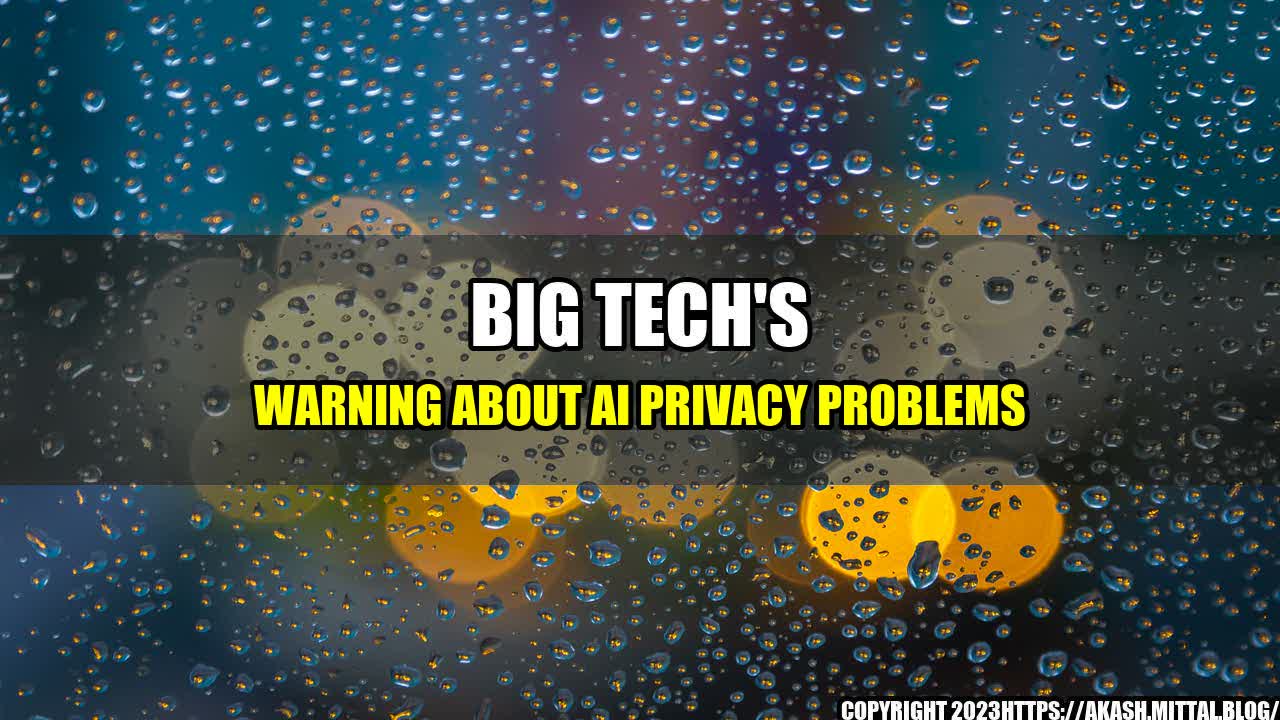Imagine walking into a store and being greeted by a holographic personal assistant who knows your name, your preferences, and your recent purchases. The assistant guides you through the store, suggests products, and even helps you pay. Sounds like a scene from a science fiction movie, right? But with the advent of artificial intelligence (AI), this scenario is becoming a reality.
However, as much as this technological advancement seems impressive, it comes with significant privacy concerns. AI collects massive amounts of data, and with it, comes the risk of unauthorized access, misuse, and abuse of personal information. Big tech companies have already raised the alarm on AI privacy problems, and it's time we pay attention.
AI is invading every aspect of our lives, from social media and e-commerce to healthcare and financial services. Here are some quantifiable examples of AI privacy problems:
- Cambridge Analytica Scandal - In 2018, it was revealed that the political consulting firm Cambridge Analytica had harvested personal data of millions of Facebook users without their consent and used it to influence the 2016 US elections.
- Facial Recognition Technology - AI-powered facial recognition systems are being used by law enforcement agencies to identify suspects, but they also raise concerns about privacy violations and racial bias.
- Healthcare Data Breaches - Medical records contain some of the most sensitive and personal information, and they're increasingly being digitized and analyzed by AI. However, healthcare data breaches are becoming more frequent, putting patients' privacy at risk.
- Smart Home Devices - Internet of Things (IoT) devices, such as smart speakers and cameras, capture and transmit a lot of personal data, including audio and video recordings. However, there have been instances of hackers gaining access to such devices and compromising people's privacy.
Practical Tips
While it's impossible to completely eliminate the risks associated with AI and privacy, there are some practical tips that can help protect your personal information:
- Read Privacy Policies - Always read the privacy policies of the products and services you use. They'll tell you what data is collected, how it's used, and who it's shared with.
- Use Strong Passwords - Use unique and complex passwords for all your online accounts, and enable two-factor authentication if available.
- Limit Data Sharing - Be cautious about sharing personal information on social media or other platforms, and opt-out of data sharing whenever possible.
- Check for Security Updates - Keep your software up-to-date with the latest security patches to avoid vulnerabilities exploited by hackers.
AI privacy problems may seem distant and abstract, but they can have real-life implications. Here are some personal anecdotes to illustrate the point:
- Jane, a Cambridge Analytica Victim - Jane had no idea her personal data was used to manipulate her political views. It wasn't until the Cambridge Analytica scandal broke that she realized the full extent of the breach. She's now much more careful about what she shares online.
- John, a Family Data Compromiser - John installed a smart camera in his baby's room to keep an eye on him from work. However, a security breach exposed the camera's footage to the internet, including images of his baby and their family in intimate moments. John now regrets the decision.
- Jessica, a Facial Recognition Suspect - Jessica was mistaken for a robbery suspect and arrested by the police because of a flawed facial recognition match. She had to go through a legal battle to clear her name and regain her privacy.
Conclusion
In conclusion, AI privacy problems are not a thing of the future but a stark reality. Big tech companies have already acknowledged the risks and warned us about them. However, protecting our privacy in the age of AI requires our active involvement and awareness. Here are three key takeaways:
- AI collects massive amounts of personal data, increasing the risks of privacy violations.
- Practical tips, such as reading privacy policies and using strong passwords, can help protect our personal information.
- Personal anecdotes, such as those shared above, illustrate the real-life impact of AI privacy problems on individuals.
Let's be proactive and vigilant about our data protection to reap the benefits of AI without sacrificing our privacy.

Curated by Team Akash.Mittal.Blog
Share on Twitter Share on LinkedIn